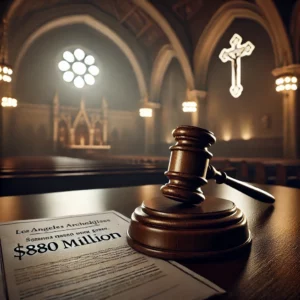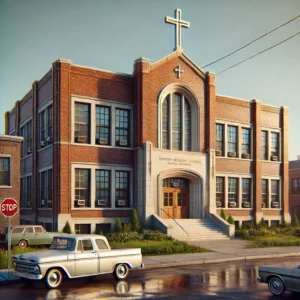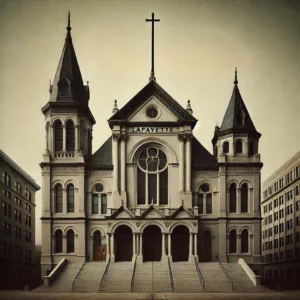University Must Provide Unredacted Investigation Documents for Judicial Review
Superior Court Judge Avion M. Benjamin ordered Seton Hall University on March 19, 2025, to provide her with an internal investigative report documenting sexual abuse allegations involving clergy at the school. The judge must review the unredacted 2019 report to determine whether plaintiffs in a massive sex abuse case targeting the Archdiocese of Newark should receive copies. This ruling comes after the revelation that the university had withheld the document, which allegedly details failures by current university president Monsignor Joseph R. Reilly to properly report sexual misconduct claims during his time as seminary rector.
5 Key Points
- Judge Benjamin ruled Seton Hall must provide her with the full investigative report and related documents for private review.
- The report, commissioned in 2019, allegedly details sexual abuse claims and institutional cover-ups at Seton Hall’s seminary.
- Attorneys for 450 plaintiffs suing the Archdiocese of Newark learned about the concealed report through media coverage in December 2024.
- Seton Hall claims attorney-client privilege protects the report despite sharing it with the Vatican.
- Monsignor Joseph Reilly, implicated in the report for failing to report abuse, was promoted to university president in July 2024.
What Does Seton Hall’s Hidden Report Contain About Sexual Abuse?
The confidential report at the center of this legal battle was commissioned by Seton Hall University in 2019 following credible allegations against Theodore McCarrick, former archbishop of Newark diocese and later the top Catholic leader in Washington, D.C. Conducted by law firms Latham & Watkins and Gibbons P.C., the investigation reportedly found decades of sexual harassment and a “culture of fear and intimidation” under McCarrick. More controversially, the report allegedly documents that current Seton Hall president Monsignor Joseph Reilly failed to properly report sexual misconduct claims during his tenure as seminary rector and dean. According to letters obtained by Politico, Reilly knew about sexual misconduct claims involving seminarians “and did not report such allegations” to school officials. Despite these findings, Reilly took just a one-year sabbatical before being promoted to lead Seton Hall in July 2024, with approval from the archdiocese. The university has fought vigorously to conceal the report, claiming it is protected by attorney-client privilege. However, plaintiffs’ attorneys argue this protection was waived when Seton Hall shared the report with the Vatican.
How Did the Plaintiffs Discover the Existence of the Hidden Report?
In a remarkable turn of events, attorneys representing hundreds of sexual abuse victims learned about Seton Hall’s concealed investigation not through the legal discovery process but from a December 2024 article published by Politico. Judge Benjamin expressed shock during a February hearing that plaintiffs’ lawyers had to discover the report’s existence through media coverage, especially since the university and archdiocese had been ordered years earlier to disclose relevant documents. “This report is from 2019. They had to find out about it in 2025 in Politico,” she remarked at the time. Following that February hearing, Seton Hall filed a motion for a protective order to keep the report private, arguing it was prepared to help the school respond to anticipated litigation and thus protected by attorney-client privilege. However, plaintiffs’ attorneys countered that Seton Hall should have disclosed the document under previous court orders and that any privilege claim was invalidated when the university shared the report with the Vatican. Attorney John Baldante described the discovery process as an “endless fight” to obtain documents from the defendants, adding that “throughout this litigation, the defendants have repeatedly violated court orders.”
Why Does Seton Hall Claim the Report Should Remain Secret?
Seton Hall has vigorously fought to keep the 2019 investigative report confidential, with university attorneys arguing that releasing it would undermine fundamental legal protections. During the March 19 hearing, Seton Hall attorney Patrick Papalia emphasized the importance of attorney-client privilege, stating: “We are dealing with such an important privilege that is the foundation of the legal system.” In court filings, Seton Hall’s legal team warned that forcing disclosure would “have a chilling effect on all universities and corporations in New Jersey, sending the message that institutions should not retain counsel to protect their rights and responsibilities in anticipation of litigation.” The university has maintained that the document is confidential under attorney-client privilege because it was prepared by outside law firms to help the school respond to potential lawsuits. However, plaintiffs’ attorneys disputed this characterization, arguing that the investigation was commissioned independently by Seton Hall’s board of regents to learn about abuse allegations and the administration’s response. They further contended that sharing the report with the Vatican waived any privilege claims under New Jersey law.
What Broader Implications Does This Case Have for Sexual Abuse Victims?
The legal battle over Seton Hall’s investigative report represents more than just a procedural dispute about document disclosure—it strikes at the heart of institutional accountability for sexual abuse. Gabriel Magee, one of the plaintiffs’ attorneys, highlighted this tension after the hearing, noting: “The Seton Hall lawyer said a couple of times that they were entitled to keep this secret and privileged because they had a common interest with the Vatican in preventing child sex abuse. But the fact that they’re fighting so hard even today to keep it secret shows you that’s not true.” The case, involving 450 plaintiffs who allege clergy sexually abused them in the Newark archdiocese, seeks to establish that such abuse was not isolated but rather reflected systemic institutional failures. As attorney John Baldante explained to reporters: “All of this really goes to the patterns and practice of the behavior within the Archdiocese of Newark and, specific to Seton Hall, within the institution of Seton Hall University. And how these institutions, whether it’s the archdiocese or its related entities, systemically and institutionally engaged in behavior to cover up and keep secret complaints and reports of sexual abuse.”
FAQ
Q: What exactly did Judge Benjamin order Seton Hall to do?
A: Judge Benjamin ordered Seton Hall to provide her with the unredacted 2019 investigative report and related documents so she can review them privately and determine whether the plaintiffs in the sexual abuse case should receive copies.
Q: Will the report become public due to this ruling?
A: Not necessarily. The judge has only ordered the university to provide her with the report for in-camera (private) review. She will then decide whether the plaintiffs should receive copies, but this doesn’t automatically make the report public.
Q: Who is Monsignor Joseph R. Reilly, and how is he connected to this case?
A: Reilly was appointed president of Seton Hall University in July 2024. He previously served as seminary rector and dean. The report allegedly documents that he knew about sexual misconduct claims at the seminary but failed to properly report them to university officials.
Q: How many plaintiffs are involved in this legal case?
A: The case involves approximately 450 plaintiffs who allege they were sexually abused by clergy in the Archdiocese of Newark. However, Seton Hall University is specifically named as a defendant in only six of these consolidated cases.
Q: What is the Archdiocese of Newark’s position on releasing the report?
A: According to a statement from Maria Margiotta, an archdiocese spokesperson, “Cardinal [Joseph] Tobin has expressed a commitment to transparency,” and a third-party review ordered last month “will be thorough and supported by Seton Hall University and the Board of Regents to help restore trust and accountability.”
Q: When was the investigative report created, and by whom?
A: The report was commissioned in 2019 following credible allegations against former Archbishop Theodore McCarrick. Seton Hall hired law firms Latham & Watkins and Gibbons P.C. to conduct the investigation into sexual abuse claims at the university’s seminary.
Q: What happens next in this legal battle?
A: Judge Benjamin will review the unredacted report and then determine whether it should be provided to the plaintiffs. It’s unclear when she will receive the documents or how long her review might take, but plaintiffs’ attorneys viewed the March 19 ruling as a significant victory.
Citations
New Jersey Monitor. (2025, March 19). Seton Hall may be forced to stop hiding what it knows about sex abuse claims. https://newjerseymonitor.com/2025/03/19/seton-hall-may-be-forced-to-stop-hiding-what-it-knows-about-sex-abuse-claims/
News From The States. (2025, March 16). Lawyers in clergy sex abuse case to square off over secret Seton Hall documents. https://www.newsfromthestates.com/article/lawyers-clergy-sex-abuse-case-square-over-secret-seton-hall-documents
PBS. (2025, March 19). NJ Spotlight News | SHU ordered to hand over report on sexual abuse allegations. https://www.pbs.org/video/dustin-racioppi-intv-1742414566/
Bishop Accountability. (2025, March 7). Seton Hall failed to disclose key report to lawyers in Catholic abuse lawsuit. https://www.bishop-accountability.org/2025/03/seton-hall-failed-to-disclose-key-report/








